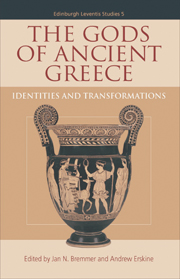Book contents
- Frontmatter
- Contents
- Preface
- List of Illustrations
- Notes on Contributors
- List of Abbreviations
- Introduction: The Greek Gods in the Twentieth Century
- 1 What is a Greek God?
- PART I SYSTEMATIC ASPECTS
- PART II INDIVIDUAL DIVINITIES AND HEROES
- 8 Zeus at Olympia
- 9 Zeus in Aeschylus: the Factor of Monetization
- 10 Hephaistos Sweats or How to Construct an Ambivalent God
- 11 Transforming Artemis: from the Goddess of the Outdoors to City Goddess
- 12 Herakles between Gods and Heroes
- 13 Identities of Gods and Heroes: Athenian Garden Sanctuaries and Gendered Rites of Passage
- PART III DIACHRONIC ASPECTS
- PART IV HISTORIOGRAPHY
- Epilogue
- Index
9 - Zeus in Aeschylus: the Factor of Monetization
from PART II - INDIVIDUAL DIVINITIES AND HEROES
Published online by Cambridge University Press: 05 August 2013
- Frontmatter
- Contents
- Preface
- List of Illustrations
- Notes on Contributors
- List of Abbreviations
- Introduction: The Greek Gods in the Twentieth Century
- 1 What is a Greek God?
- PART I SYSTEMATIC ASPECTS
- PART II INDIVIDUAL DIVINITIES AND HEROES
- 8 Zeus at Olympia
- 9 Zeus in Aeschylus: the Factor of Monetization
- 10 Hephaistos Sweats or How to Construct an Ambivalent God
- 11 Transforming Artemis: from the Goddess of the Outdoors to City Goddess
- 12 Herakles between Gods and Heroes
- 13 Identities of Gods and Heroes: Athenian Garden Sanctuaries and Gendered Rites of Passage
- PART III DIACHRONIC ASPECTS
- PART IV HISTORIOGRAPHY
- Epilogue
- Index
Summary
THE GODS IN TRAGEDY
It is often emphasized that we must be careful to avoid seeing the Greek gods through Christian spectacles. But the emphasis has, I suggest, itself often distorted our view. Here, for instance, in an influential paper on the Oedipus Tyrannus, is E. R. Dodds:
We cannot hope to understand Greek literature if we persist in looking at it through Christian spectacles. To the Christian it is a necessary part of piety to believe that God is just. And so it was to Plato and the Stoics. But the older world saw no such necessity. If you doubt this, take down the Iliad and read Achilles' opinion of what divine justice amounts to (24. 525–33); or take down the Bible and read the Book of Job.
But what is this supposedly decisive opinion of Achilles? That Zeus has two urns, from which he distributes to men either a mixture of sorrows and blessings or mere sorrows. This idea, which occurs only this once in Homer, does not in fact exclude the possibility that Zeus upholds justice and punishes injustice. True, the Homeric Zeus does not on the whole have such a role, at least as far as our conception of justice is concerned. But what has been ignored until recently is that he and other gods have a strong sense of the reciprocal obligation imposed on them by (especially) animal sacrifices, even if they are sometimes unable to fulfil it.
- Type
- Chapter
- Information
- The Gods of Ancient GreeceIdentities and Transformations, pp. 178 - 192Publisher: Edinburgh University PressPrint publication year: 2010

